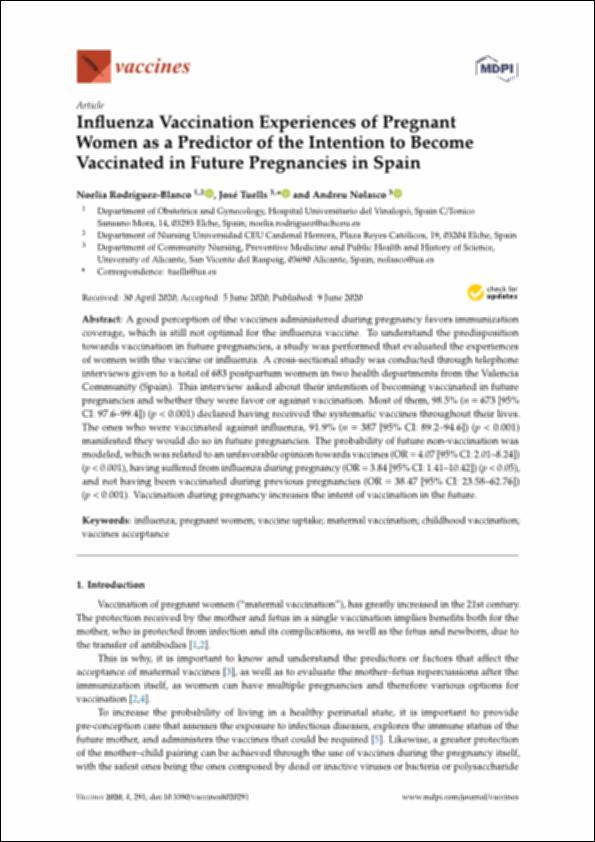Please use this identifier to cite or link to this item:
http://hdl.handle.net/10637/12761Influenza vaccination experiences of pregnant women as a predictor of the intention to become vaccinated in future pregnancies in Spain
| Title: | Influenza vaccination experiences of pregnant women as a predictor of the intention to become vaccinated in future pregnancies in Spain |
| Authors : | Rodríguez Blanco, Noelia Tuells Hernández, José Vicente Nolasco Bonmatí, Andreu |
| Keywords: | Influenza - Vaccination.; Vacunas.; Vacunación de niños.; Gripe - Vacunación.; Vaccines.; Mujeres embarazadas.; Pregnant women.; Vaccination of children. |
| Publisher: | MDPI. |
| Citation: | Rodríguez-Blanco, N., Tuells, J. & Nolasco, A. (2020). Influenza vaccination experiences of pregnant women as a predictor of the intention to become vaccinated in future pregnancies in Spain. Vaccines, vol. 8, i. 2 (09 jun.), art. 291. DOI: https://doi.org/10.3390/vaccines8020291 |
| Abstract: | A good perception of the vaccines administered during pregnancy favors immunization coverage, which is still not optimal for the influenza vaccine. To understand the predisposition towards vaccination in future pregnancies, a study was performed that evaluated the experiences of women with the vaccine or influenza. A cross-sectional study was conducted through telephone interviews given to a total of 683 postpartum women in two health departments from the Valencia Community (Spain). This interview asked about their intention of becoming vaccinated in future pregnancies and whether they were favor or against vaccination. Most of them, 98.5% (n = 673 [95% CI: 97.6–99.4]) (p < 0.001) declared having received the systematic vaccines throughout their lives. The ones who were vaccinated against influenza, 91.9% (n = 387 [95% CI: 89.2–94.6]) (p < 0.001) manifested they would do so in future pregnancies. The probability of future non-vaccination was modeled, which was related to an unfavorable opinion towards vaccines (OR = 4.07 [95% CI: 2.01–8.24]) (p < 0.001), having su ered from influenza during pregnancy (OR = 3.84 [95% CI: 1.41–10.42]) (p < 0.05), and not having been vaccinated during previous pregnancies (OR = 38.47 [95% CI: 23.58–62.76]) (p < 0.001). Vaccination during pregnancy increases the intent of vaccination in the future. |
| Description: | Este artículo se encuentra disponible en la siguiente URL: https://www.mdpi.com/2076-393X/8/2/291 Este artículo pertenece al número especial "Strategies to increase vaccination coverage and vaccine confidence". |
| URI: | http://hdl.handle.net/10637/12761 |
| Rights : | http://creativecommons.org/licenses/by/4.0/deed.es |
| ISSN: | 2076-393X (Electrónico). |
| Issue Date: | 9-Jun-2020 |
| Center : | Universidad Cardenal Herrera-CEU |
| Appears in Collections: | Dpto. Enfermería y Fisioterapia |
Items in DSpace are protected by copyright, with all rights reserved, unless otherwise indicated.


